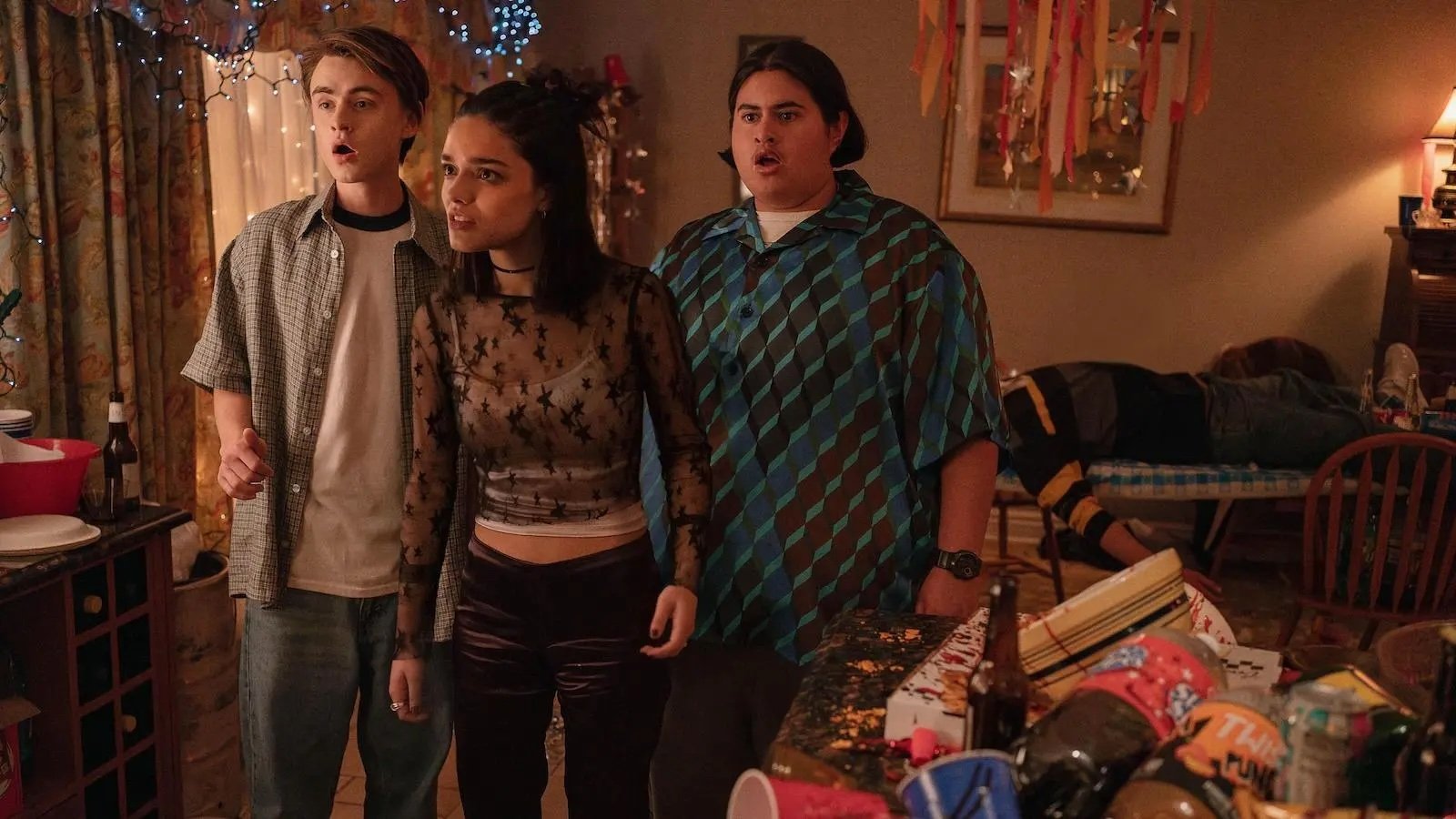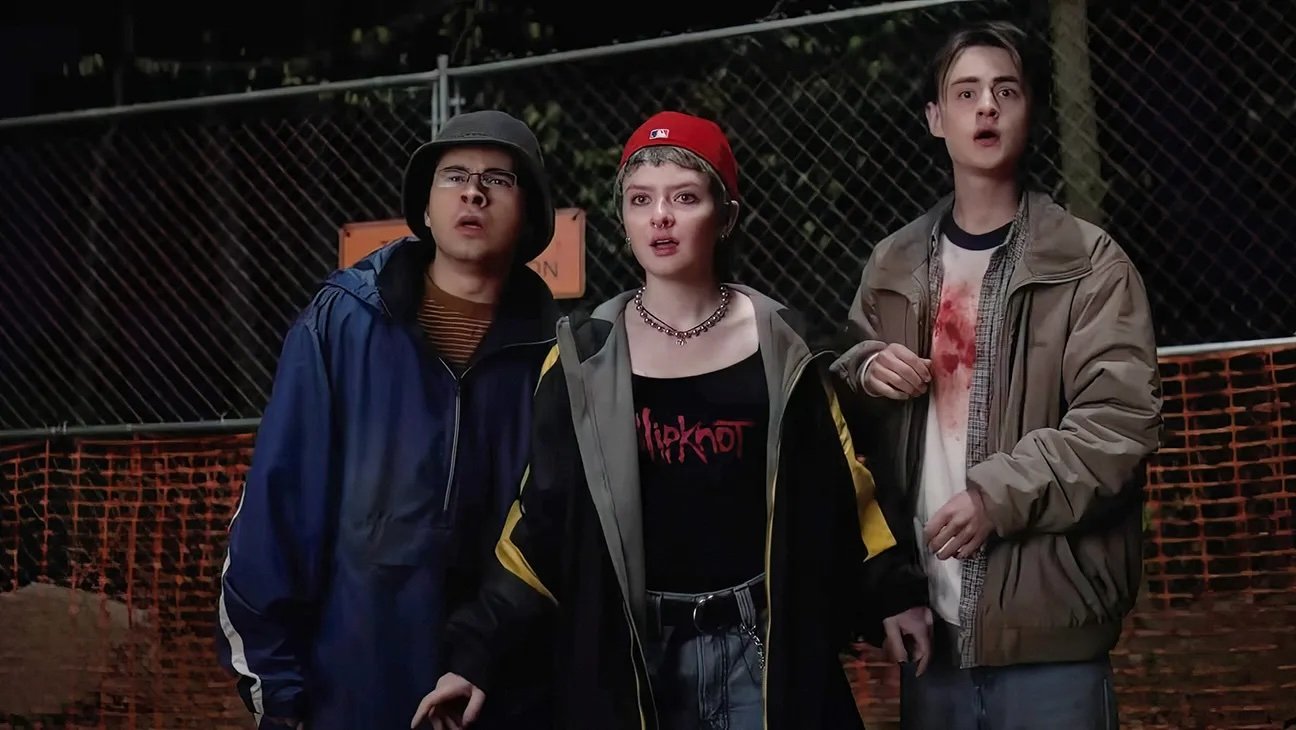Y2K’s a Fun Creature Feature that Tangles Itself Up in Shag
I remember the late 1990s as a time when the world seemed big and exciting, including my elementary school, which felt very grown up to a six-year-old. I remember Highlander was the TV show for my folks, Roland Emmerich’s Godzilla and Joe Dante’s Small Soldiers were the coolest movies in the world, and Pikachu was cute.
The world is big and exciting, and so much more fraught than I had the perspective to see and the language to describe as a kid. My elementary school felt grown up because it was designed that way—it’s scaled so that it feels big and inviting to kids. Years later, when I photographed its library during my brief time working for a local weekly newspaper, I was surprised to see that I towered over everything—all 5’3’’ of me. I’m very fond of the first Highlander film but cannot speak to the TV series beyond the pilot episode. Godzilla is terrible, and Small Soldiers, while messy, is fascinating and quite fun. Pikachu is, indeed, cute. In other words, my memories of the ‘90s are a child’s memories, and I’ve always found it fascinating to see how folks who lived through that time approach the first decade I was alive in culture.
With amiably zonko, frustratingly lumpy horror comedy Y2K, writer/director Kyle Mooney (Brigsby Bear), writer/producer Evan Winter and their peers present the last day of the millennium as a time where the monoculture was starting to churn and split and the internet was still a relative niche but getting more and more known outside of folks who knew what “Halt and Catch Fire” meant. The ennui and searching of the early decade lingered alongside an anger looking for a usually cruel outlet, and the potential of the new century had folks on edge. Mooney and Winter mix this latent energy with disaster, as the Y2K bug brings about the singularity and unleashes a rampant and deeply obnoxious AI and its army of household appliance chimeras on a house of hapless teens who wanted to ring in January 1.
As an act of pastiche and cultural archeology, Y2K is fascinating. As a stage, it gives a strong ensemble of young actors some space to do relatively fun work. As a creature feature, it’s a riot—its chimeras are marvelously designed and delightfully vicious. As a horror film, it’s got an all-timer of an introductory rampage with selected highlights thereafter. As a comedy, it’s a coin toss. I had a good time with it, but it’s a 90-minute horror comedy that’s shaggy, draggy, and could stand to get to the damn verb more often. I cannot call it successful, but for the right folks, it’s well worth a watch.
Speaking personally, the best parts of Y2K are the ones that weave together the absurdity of its situation into the absurdity of life in the United States on December 31, 1999. The chimeras work as well as they do because they’re built from (and driven by) a gestalt of mass culture that remains recognizable, even when twisted to murderous ends—a Tamagotchi, for example, drills its way into an unfortunate teen’s brain, just literally as opposed to metaphorically.
Mooney, whose work in Brigsby Bear showcased his talent for absurdity and escalation, proves adept at set pieces, whether horrific (the kick-off massacre), comedic (the revelation of Limp Bizkit’s Fred Durst as “Fred Durst”), or a combination thereof. He struggles with the connective tissue and big-picture pacing, which is exacerbated by his juggling a large ensemble cast, one which remains sizable even with regular culling. Stars Jaeden Martell (Knives Out), Rachel Zegler (West Side Story), Julian Dennison (Hunt for the Wilderpeople), Lachlan Watson (Chucky), and Daniel Zolghadri (Eighth Grade) are talented and have solid chemistry with each other and with Fred Durst, but their character development is halting and awkward. The long conversations that rule Y2K’s moments of quiet emphasize the expository over the human, prioritizing the delivery of information rather than conveying feeling and building space for empathy.
The result is that, despite its compact runtime, Y2K trips over itself repeatedly and fails to let its best moments take flight. Add in a central antagonist whose obnoxiousness reads as genuine to late ‘90s internet culture but who doesn’t quite have the teeth to cross from annoying to truly threatening, and the picture sputters. It has charm and fun carnage, and its invocation of the era is interesting, but it doesn’t quite work. Maybe folks who were teenagers in 1999 will get more out of it than I did.



Justin Harrison is an essayist and critic based in Austin, Texas. He moved there for school and aims to stay for as long as he can afford it. Depending on the day you ask him, his favorite film is either Army of Shadows, Bring Me the Head of Alfredo Garcia, The Brothers Bloom, Green Room, or something else entirely. He’s a sucker for crime stories. His work, which includes film criticism, comics criticism, and some recent work on video games, can be found HERE.